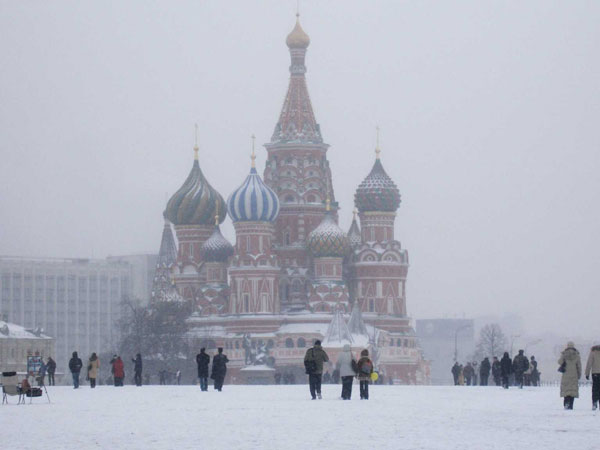Moscow's climate is tougher than other capitals
Moscow meteorological center has conducted analysis and comparison of winter climatic conditions in Moscow, Russia with some major cities in Europe.
Based on figures from the World Meteorological Agency, the Director General of the Moscow Meteorological Center, Alexei Lyakhov said the climate in Moscow was more severe than in other European capitals. The highest average air temperature during the day and the lowest average night temperature in Moscow is usually lower than cities in the same continents as Helsinki, Oslo, Stockholm, Berlin and Prague.

Winter in Moscow is often longer and colder than other European cities.
According to Mr. Lyakhov, in Berlin, the highest daytime temperature in December is 4.4 degrees Celsius, January - 2.2 degrees Celsius, February - 4.2 degrees Celsius, while the corresponding indexes are In Moscow, it is 8.6 degrees Celsius, minus 12.3 degrees Celsius, minus 11.1 degrees Celsius. Scandinavian capitals, near Atlantica and the Gulf Stream are much warmer.
Snowfall in Moscow in November is 8cm thick, December 48cm, January - 46cm, February - 43cm, March - 11cm. Therefore, Moscow has to clear the snow daily, otherwise the thin ice or ice sheets are always gobbled up all over the streets and sidewalks from the beginning of winter to the spring. In contrast, the cities of Helsinki and Oslo are covered with snow, cyclically under high temperature.
Mr. Lyakhov said that the winter in Moscow is often longer and colder than other European cities. For a year, Moscow fell into cold weather at a temperature of no less than 136 days, while people in Helsinki had to live in ice for only 132 days, Oslo - 114 days, Stockholm - 94 days and Berlin - 29 days. The lowest temperature ever seen in the winter in Moscow measured in 1940 was minus 42.1 degrees Celsius, then the city of Helsinki was 34.3 degrees Celsius in 1987.
Moscow is the city with the highest continental shelf on the list of cities analyzed, so the temperature difference between winter and summer in this city is relatively large. The highest average temperature in January is minus 12.3 degrees Celsius, while the highest average temperature in July is 23.1 degrees C.
In Helsinki, the indicators are negative 9.3 degrees Celsius in February and 21.8 degrees Celsius in July. However, the average rainfall in Moscow is 134mm, lower than Helsinki - 152mm, Oslo - 140mm, Stockholm - 122mm and Berlin - 130mm.
- Pessimistic forecast about the next 100 years
- The 10 cleanest capitals in the world
- Fragile like butterfly wings, what will their fate be when the rain comes?
- Mediterranean climate
- This is how Dubai copes with climate change
- Climate change is happening faster than expected
- What is Climate Change?
- 4 shocking findings on climate change
- Arctic - evidence of global warming
- Marching for climate change around the world
- America pays money to save climate conferences
- Spider silk may have springs or rubber properties
 Is the magnetic North Pole shift dangerous to humanity?
Is the magnetic North Pole shift dangerous to humanity? Washington legalizes the recycling of human bodies into fertilizer
Washington legalizes the recycling of human bodies into fertilizer Lightning stone - the mysterious guest
Lightning stone - the mysterious guest Stunned by the mysterious sunset, strange appearance
Stunned by the mysterious sunset, strange appearance